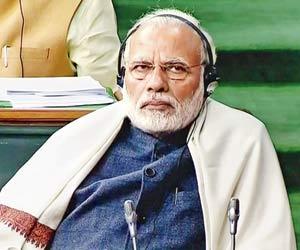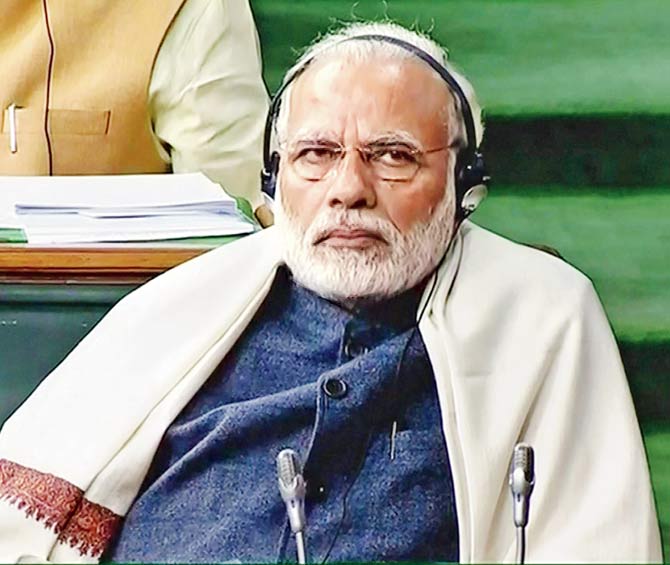In the 2019 parliamentary polls, the battlefield will be Indian hearts and minds; the weaponry will be fake news and truth the first casualty


PM Narendra Modi on the last day of Parliament’s winter session in New Delhi on Friday. No doubt, after Holi, the war will begin for the 2019 election. Pic/PTI
 On New Year's Day, I returned to Mumbai after a 36-hour trip to see my daughters who were passing through Delhi on their way back to California, and due to the dense fog in the national capital my flight was delayed by four hours, two of which were spent in the aircraft before take-off. All passengers were silent throughout the wait, but once we were in the air the aircraft turned into a talkfest. Everyone in the aisles around me were chattering loudly, as if with old friends. The amazing thing about talk is that a person of beauty and style can open her mouth to reveal shallowness and fakery. The two seats next to me, on the other hand, were occupied by blue-collar workers of information technology (that's how my elder daughter, the software engineer, describes them).
On New Year's Day, I returned to Mumbai after a 36-hour trip to see my daughters who were passing through Delhi on their way back to California, and due to the dense fog in the national capital my flight was delayed by four hours, two of which were spent in the aircraft before take-off. All passengers were silent throughout the wait, but once we were in the air the aircraft turned into a talkfest. Everyone in the aisles around me were chattering loudly, as if with old friends. The amazing thing about talk is that a person of beauty and style can open her mouth to reveal shallowness and fakery. The two seats next to me, on the other hand, were occupied by blue-collar workers of information technology (that's how my elder daughter, the software engineer, describes them).
The younger of the two, a cloud manager at a well-known engineering giant, asked me what I thought of the Ramayana. What an unusual question. I struggled to articulate my thoughts because, frankly, the epic doesn't interest me much, though I used to recite the Hanuman Chalisa daily while living in Sewri. At times like this, I resort to mentioning the nationalist poet C Subramania Bharati's short story in which Ravana is a gentlemanly and scholarly hero who saves Sita from being ravaged by two louts named Rama and Lakshmana (they were particularly villainous with Ravana's sister). When I told her this, my mother said: "Fake news", but I replied saying it was a good change of perspective that preserved the basic timeline.
The cloud manager pointed out that most people accepted the original epic mechanically and uncritically. They told their children to internalise it as it is, without even explaining it as a simple morality play. He then spoke of the misunderstandings about other religions.
The other fellow, who was moving to Mumbai for a digital job in a mammoth American publishing company opening shop in India, jumped in. He spoke of how each religion has been diverted from its original purpose, etc. I didn't want to talk about any of this because (a) in these highly polarised times, you don't want to get into an argument with a stranger, and (b) I simply don't know where to begin. Usually I find that if I try to get to the root of the topic at hand, my audience loses interest. Nonetheless, I jumped in, talking about the vested power elite of each religion - the clergy - and how, to retain power and influence, the elite had corrupted an idea in its original form to something fake and unrecognisable.
The two fellows became excited and began talking about the Rothschild family. "What?" I said. "You mean that ancient banking family?" Yes, yes. They gushed about the major conspiracy each had read, about how the Rothschilds had engineered the financial crisis of 2008. I was taken aback. How in the world would the family that invented the banking system benefit from its collapse? And, more selfishly, why weren't the Rothschilds recapitalising India's banks? I asked them to explain precisely. But they seemed uncertain, falling back on a vague argument that the banking system's failure would consolidate the Rothschilds' grip on the world's finances and politics, especially that in Washington DC. I shook my head in dismay, and wondered where it was that these kids were reading such half-baked conspiracy theories.
"On Facebook, of course," my friend, the screenwriter, said when I reached his place in Versova. Okay, I realised: The reason I missed this fake news is because I had deactivated my Facebook account six months ago (to work on my book that comes out in May-June; do save up your hard-earned money and buy a copy). In that swamp of re-posted crap is a vast worldwide conspiracy theory involving the Rothschilds that resurfaces from generation to generation. But both these youngsters - one in his late 20s, the other in his late 30s - had bought it, lock stock and barrel.
My conversation ended there, as I preferred to dive into a terribly engrossing true crime book, but not without noting that while we spoke of religion and global politics, no one touched upon India's most explicit intersection of the two - which is our Great Leader and his gang. They run India's biggest sausage factory of fake news. Perhaps these two young gentlemen did not want to touch on that subject, because while their minds may believe him to be a charlatan, their hearts tell them to stick with him. No doubt, after Holi, the big year-long war will begin for the 2019 parliamentary election. The battlefield will be Indian hearts and minds; the weaponry will be fake news. We will need to attune our senses to what constitutes the fuzzy truth.
Aditya Sinha's crime novel, The CEO Who Lost His Head, is available now. He tweets @autumnshade. Send your feedback to mailbag@mid-day.com
Download the new mid-day Android and iOS apps to get updates on all the latest and trending stories on the go
 Subscribe today by clicking the link and stay updated with the latest news!" Click here!
Subscribe today by clicking the link and stay updated with the latest news!" Click here!









